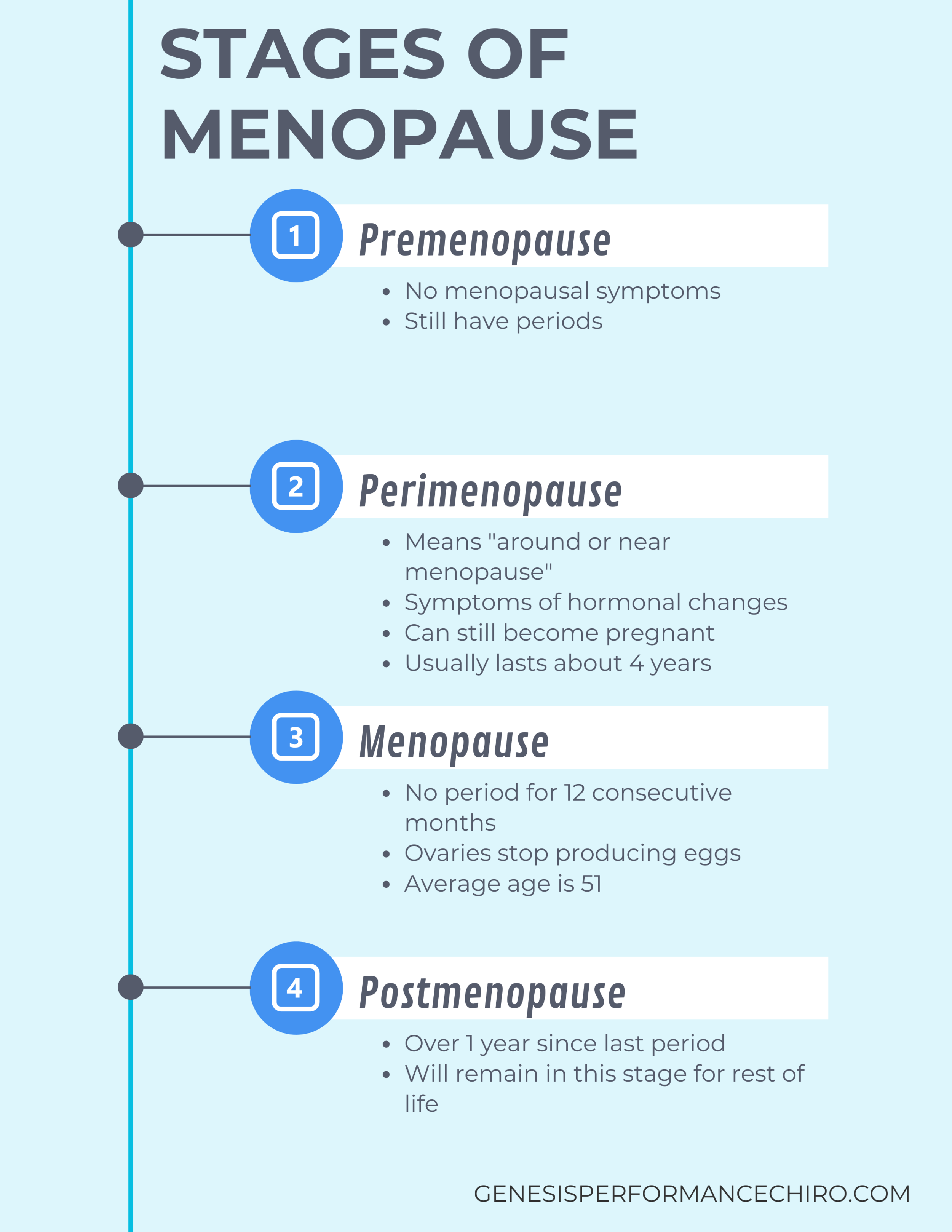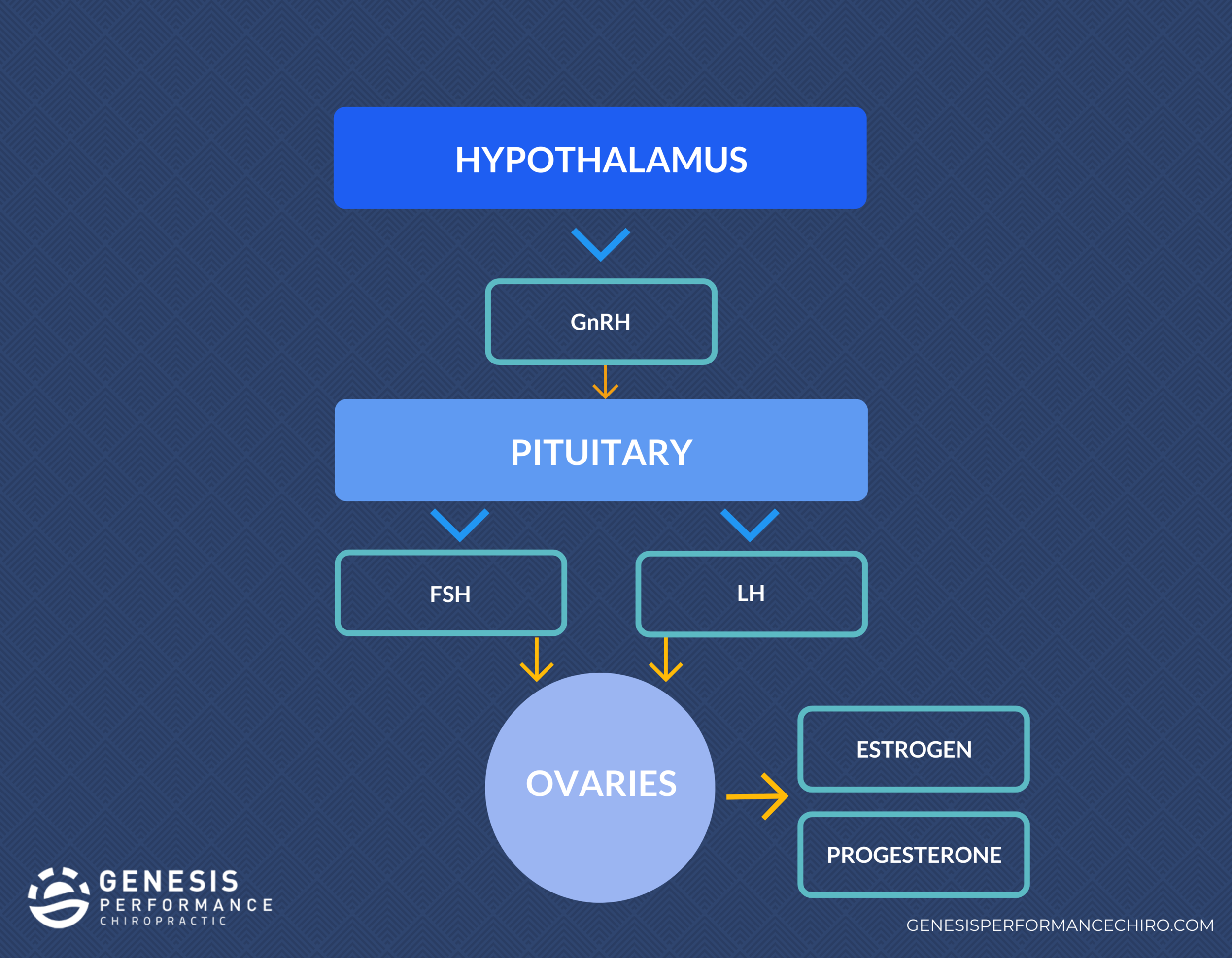Understanding the Stages and Challenges of Menopause
Women go through pretty remarkable physical changes throughout their lives. What a woman’s body is capable of doing is extraordinary and how women adjust to the changes is that much more extraordinary. In this particular series, I focus on changes to the body before, during, and after menopause.
The Stages of Menopause
As you know, menopause indicates the end of reproduction for a woman. There are various stages of menopause, and the entire process can take a few years. Commonly, women reach menopause in their 40s or 50s, but the average age is 51 in the United States (1). The stages in a woman’s life are as follows:
premenopause, perimenopause, menopause, and postmenopause.
Premenopause - Premenopause is the time before any menopausal symptoms occur. Women still have periods, whether they are regular or irregular. Women are also still in their reproductive years. While hormonal changes may be occurring in the body, there aren’t any evident changes from them. Hormonal changes may begin 8 to 10 years before menopause actually occurs, often in a woman’s 40s, but it can begin in the 30s as well. I like to start checking hormones in women around the age of 35 years old to make sure hormones are adequate. I will check sooner if warranted by symptoms or illness.
Perimenopause - Perimenopause means “around or near menopause.” During this stage, women begin to experience symptoms of hormonal changes. The average length of the perimenopause stage is about four years. For some, it may only last a few months, and others, it may go beyond the four years. During this time, it is still possible to become pregnant.
Menopause - Menopause occurs when a woman no longer gets a menstrual period for 12 consecutive months. This is when the ovaries have stopped producing eggs and have also stopped producing most of their estrogen. As noted, the average age of menopause is 51 years old.
Postmenopause - If it has been over a year since a woman’s last menstrual cycle, she is then in the postmenopause stage. She will continue to be in this stage for the remainder of her life.
Symptoms or challenges of the perimenopause stage can be very similar to the symptoms or challenges of menopause or postmenopause.
The Role of Hormones
Hormones play a big role in menopause. If you remember from biology class, hormones are chemical messengers that are secreted in the blood or other extracellular fluids. They send messages to specific parts of the body, or target sites to tell these parts what to do. Five hormones central to menopause are follicle-stimulating hormone (FSH), luteinizing hormone (LH), gonadotrophin-releasing hormone (GnRH), progesterone, and estrogen. Let’s review what the roles of these hormones are before we dive into the challenges associated with hormonal changes.
Follicle-stimulating hormone (FSH) - FSH plays a large role in controlling the menstrual cycle and stimulates the growth of eggs in the ovaries. FSH levels vary throughout the menstrual cycle, and FSH has its highest levels just before the egg is released by the ovary.
Luteinizing hormone (LH) - LH helps to control the menstrual cycle as well as helps to release an egg from the ovary.
Both FSH and LH stimulate estrogen production, specifically estradiol.
Gonadotrophin-releasing hormone (GnRH) - is released by the hypothalamus in order to stimulate the pituitary release of FSH and LH.
Progesterone - Progesterone prepares the endometrium, which is the inner lining of the uterus, for a potential pregnancy. It signals the lining to thicken to provide an appropriate home for a fertilized egg. Progesterone also stops uterus contractions that would cause the body to reject an egg. If a pregnancy occurs, progesterone levels remain high, preventing ovulation. If a pregnancy does not occur, progesterone levels lower, allowing menstrual cycles to continue.
Estrogen - Estrogen plays a big role in puberty and beyond. The main source of estrogen comes from the ovaries, but adrenal glands and fat tissues also make small amounts of this hormone. Estrogen is responsible for:
Growth of breasts in puberty
Growth of pubic and underarm hair
The onset and regulation of the menstrual cycle
Cholesterol control
Protection of bone health
Health of brain, heart, skin, and other tissues (2)
As perimenopause and menopause begin, hormone levels can still look somewhat normal. However, as a woman reaches the later stages of menopause, estrogen and progesterone levels are low, while LH and FSH increase trying to stimulate estrogen. FSH and LH will then remain high for the rest of the woman’s life.
Changes that Occur Through Stages of Menopause
Here are some major changes that are happening to a woman’s body as she reaches menopause:
There is an exhaustion of follicles - Ovarian follicles contain egg cells, which are released during ovulation. Over the period of production, ovarian follicles decrease steadily. In the perimenopause stage, follicles are present and eggs are released, allowing pregnancy to still be a possibility, though it’s often more difficult. While you still have some follicles at the menopausal stages, they are significantly fewer.
2. Ovaries stop releasing eggs - This is the hallmark sign of menopause. As you get closer to menopause, periods and ovulation can become more irregular. At menopause, ovulation stops entirely.
3. Ovaries stop making estrogen and progesterone - Estrogen and progesterone are essential for control of the menstrual cycle and reproduction. With menopause, the ovaries cease to make these hormones. Estrogen now comes from adrenal production and fat cells. The decrease in estrogen decreases the metabolic rate in which women use starches and carbs. This can contribute to weight gain women experience in menopause.
4. LH and FSH levels increase - Because the ovaries stop making estrogen, there is no longer enough estrogen to turn off FSH, which allows these levels to increase. The same is true of LH.
Challenges and Changes During Menopause
With these major changes in the body during menopause, women can experience a variety of challenges from the classic hot flashes to mood swings to UTIs. In this article, I will give an overview of these challenges to familiarize patients with what to expect. Look out for more articles in my menopause series to learn more about how to address these challenges.
Urologic Challenges
Estrogen can strengthen the urinary tract tissue through strengthening the bladder’s surface layer. Because of the decrease in estrogen in menopause, the urethra and bladder lining thin. This thinning allows for folds that can become pockets for infections to thrive, allowing more UTIs to occur in the perimenopausal, menopausal, and postmenopausal stages. Women can experience dysuria, or pain/discomfort during urination. However, I have also seen many menopausal or postmenopausal women who have no UTI symptoms, though through a lab urinalysis, we find UTI’s. These continual UTIs slowly wear down the immune system opening these women up to inflammation and more infections.
Vaginal Changes
Beginning at perimenopause, a decrease in estrogen may cause the vulva tissues and vaginal lining to become thinner, dryer, and less elastic. This is known as vulvovaginal atrophy. Women experience lower amounts of vaginal secretions and decreased lubrication. This can cause dryness, itchiness, burning, irritation, and/or vaginal pain. Intercourse can be uncomfortable or painful (3). Some women may experience this early in perimenopause, while others won’t experience it until several years after reduced estrogen levels or potentially not at all. These symptoms can also relate to a vaginal bacterial or yeast infection (also an increased risk during menopause) or a UTI. I like to use all natural vaginal suppositories with women as we work to regulate hormones and other factors.
Neurologic Challenges
A decrease in estrogen levels may also lead to challenges in the brain. Cells throughout the brain have estrogen receptors, and reduced estrogen levels lead to reduced signaling to these brain cells. This can leave the brain more susceptible to disease and dysfunction. Mounting research is beginning to show a connection between menopause and Alzheimer’s. Menopause can also lead to headaches, mood changes, memory loss, depression, and anxiety (4, 5).
Hot Flashes/Night Sweats
A hot flash is a sudden feeling of warm, which is usually around the face, neck, and chest. Women may also experience a rapid heartbeat, flushed appearance (possibly including red, blotchy skin), anxiety, and/or perspiration during a hot flash. They usually last around 5 minutes. As the hot flash passes, a chilled feeling may follow. Night hot flashes, or night sweats, that occur frequently may cause long-term sleep disruptions. While no one knows exactly why hot flashes occur, it’s suspected that decreased estrogen levels causes your hypothalamus (your body’s thermostat) to become more sensitive to minor changes in body temperature. If the hypothalamus thinks your body is too warm, it starts a hot flash to attempt to cool you down (6).
Joint Pain
Low estrogen levels in menopausal and postmenopausal females is also associated with an increase in joint pain. You may notice that previous joint injuries may once again begin to ache, and you may feel pain in joints overall. While this isn’t completely understood, estrogen is thought to decrease inflammation in the body. The lack of estrogen may allow inflammation to increase, causing joint pain.
Weight Gain
The hormonal changes that go along with menopause may also cause weight gain. As I discussed earlier, ovaries have stopped producing estrogen, and this hormone now comes from adrenal production and fat cells, which influences the way women process starches and carbs. This hormone shift has a great influence on where women tend to gain weight. Prior to menopause, women with balanced hormones tend to gain weight around thighs and buttocks in the form of subcutaneous fat. As hormone levels decrease during menopause, they tend to gain visceral fat in the stomach. Visceral fat does not produce much estrogen and is more inflammatory.
Thyroid function can also decline at this point in life, which can lead to weight gain. Hypothyroidism may share symptoms with menopause, such as fatigue, anxiety/depression, mood swings, and sleep disturbances. However, women may not always be tested for thyroid disease, as these symptoms are often attributed to menopause alone (7). For more on how to properly test for thyroid conditions, read our article here.
Blood sugar dysregulation issues can also occur with menopause. The shift in estrogen and progesterone levels changes how cells respond to insulin. Insulin helps to keep blood sugar levels under control, so these menopausal hormonal shifts can trigger fluctuations in blood sugar levels, especially in women who have diabetes. If blood sugar levels are too high, this can lead to weight gain (8).
Post menopausal women often need a lower carb diet and nutritional support to keep blood sugar levels normal and to stay at their optimal weight level.
Look out for my next few articles where I will discuss how I address the unique challenges of menopause with my patients. Though these challenges can be overwhelming, our caring and skilled practice can help. I would love to support you in meeting your health goals and feeling like yourself during this important transition.
Works cited:



